
Images used in this research are taken from other Home Pages.
Please click on the image to follow up a link to the original source of the image.


To see a more enhanced page with frames
To see some images from Anglo-Saxon Culture CLICK HERE
![]()
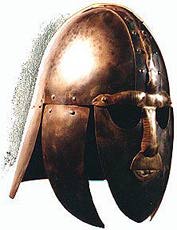 The section entitled "Further
Celebration at Heorot" opens
The section entitled "Further
Celebration at Heorot" opens
 Beowulf's boasts illuminate
his heroic deeds. His crowing
Beowulf's boasts illuminate
his heroic deeds. His crowing"Keep yourself against that wickedness, beloved
Beowulf, best of men, and choose better-eternal
gains. Have no care for pride, great warrior. Now
for a time there is glory in your might: yet soon it
shall be that sickness or sword will diminish your
strength, or fire's fangs, or flood's surge, or sword's
swing, or spear's flight, or appalling age; brightness
of eyes will fail and glow dark; then it shall be that
death will overcome you, warrior."
Hrothgar is a wise and noble king. He is much older than
Beowulf and sees much of his former self in the young warrior.
Having lived and learned many lessons from the thousands of
experiences that Beowulf has yet to face, with great affection for
Hygelac's thane, Hrothgar tries to use his wisdom to help and
Beowulf on the difficult road ahead. To illustrate his point,
Hrothgar recounts the story of Heremod, a miserably notorious
king, who stayed from the codes and procedures of that warrior
caste. The evil one's main failure was a lack of respect for his
people. As Hrothgar explains, "He grew great, not for their joy,
but for their slaughter." Not only did Heremod fail to share a
portion of the wealth and power that God has given him with
his loyal retainers. he performed the most heinous of crimes,
the killing of his own clansman. In the end, this king, having
failed to live a just life, had few friends and died unhappy.
Then his people, without longing for their departed king,
advanced someone else to the office.
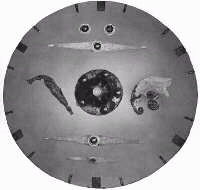 Beowulf does
not have any fear that Hrothgar's vision
Beowulf does
not have any fear that Hrothgar's vision
is in his future. He is confident of his amazing courage.
His states, "Sometimes fate can save the undoomed man
if his courage is good." He is impervious to the mortal vices, which
would certainly have harmed a lesser man, and he quickly comes to the
bright light of such fame and glory. His fate (wyrd) is to remain forever
true to the path of his warrior code.
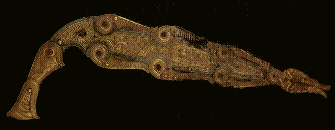 If Beowulf
represents the heroic light,
If Beowulf
represents the heroic light,
the monsters Grendel and his mother are
compelled to darkness. The misunderstood
Grendel is angry, because he does not look like everyone else. He is shunned
by the people and cursed by God. Grendel does not have the same privilege
the warriors do. He can not enter the mead hall and partake of the feasting
and drinking that often occurs in Heorot Hall. In time he learns to take his
ostracism out on the others who are not related to his fate.
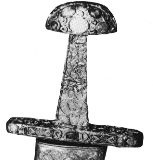 During the
poem many different swords were used. The
During the
poem many different swords were used. The
swords represent special roles. Just as the legendary King
Arthur has his sword Excalibur, with its unique abilities, so
too do many of the characters in Beowulf. The older the
weapon, the more esteemed it is. Even the number of battles that
swords had been in and the amount of blood that they had shed had a
symbolic value to their owners.
 God also
plays an important role in this chapter. He is
God also
plays an important role in this chapter. He is
constantly being preyed to and thanked. The older
(Pagan) gods are referred to as Giants, who were killed by the true God
with "water's welling," a reference to the Christian biblical flood concerning
the story of Noah, his family and the animals saved in Noah's Ark.
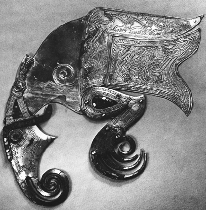 Beowulf
stands in this chapter as a champion amongst the
Beowulf
stands in this chapter as a champion amongst the
other warriors, and he is honored and well received at the
newly renovated (sans monsters) Great Hall. God is thanked
and everyone drinks. They await the further adventures of Beowulf.
![]()
![]() Click here to learn more about Beowulf Project
Click here to learn more about Beowulf Project
![]() Here is the translation of Beowulf
Here is the translation of Beowulf
![]() Click
Here to see the map of Beowulf's journey.
Click
Here to see the map of Beowulf's journey.
![]() Do a search on the literature here...
Do a search on the literature here...
![]() Read
Beowulf online with footnotes
Read
Beowulf online with footnotes
![]()
Infoseek Search Engine
All In One Search Page ![]() Inktomi
Research Based Engine
Inktomi
Research Based Engine
If you have comments or suggestions, please email at: